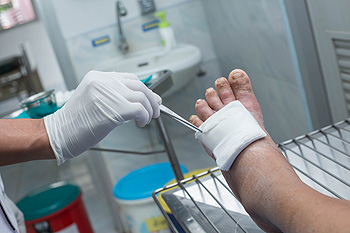
Diabetic foot ulcers pose a significant risk to individuals with diabetes, often occurring on the ball of the foot or the bottom of the big toe. While some foot ulcers may not cause pain, it's important to seek immediate medical attention, as neglecting them can lead to infections and potential limb loss. Treatment approaches vary depending on the severity of the diabetic foot ulcer. Among them are X-rays to assess bone health and debridement, or cleaning out dead tissue, which may require hospitalization. Special footwear or braces may be recommended to protect the foot and aid healing. In cases of poor circulation, consultation with a vascular surgeon may be necessary. Even after an ulcer heals, ongoing care is vital to prevent recurrence, including the use of specialized footwear and daily foot monitoring for any sores or trouble spots. Individuals with diabetes face a higher risk of amputation, due to complications like peripheral artery disease and neuropathy, but limb loss can be prevented with regular foot care, proper medical supervision, and suitable footwear. Dealing with diabetic foot ulcers includes having a podiatrist as a member of your healthcare team. For help with foot ulcers, it is suggested that you make an immediate appointment with a podiatrist for care.
Diabetic foot care is important in preventing foot ailments such as ulcers. If you are suffering from diabetes or have any other concerns about your feet, contact Mark Poplawski, DPM from Jersey Shore Podiatry, LLC. Our doctor can provide the care you need to keep you pain-free and on your feet.
Diabetic Foot Care
Diabetes affects millions of people every year. The condition can damage blood vessels in many parts of the body, especially the feet. Because of this, taking care of your feet is essential if you have diabetes, and having a podiatrist help monitor your foot health is highly recommended.
The Importance of Caring for Your Feet
- Routinely inspect your feet for bruises or sores.
- Wear socks that fit your feet comfortably.
- Wear comfortable shoes that provide adequate support.
Patients with diabetes should have their doctor monitor their blood levels, as blood sugar levels play such a huge role in diabetic care. Monitoring these levels on a regular basis is highly advised.
It is always best to inform your healthcare professional of any concerns you may have regarding your feet, especially for diabetic patients. Early treatment and routine foot examinations are keys to maintaining proper health, especially because severe complications can arise if proper treatment is not applied.
If you have any questions please feel free to contact our office located in Toms River, NJ . We offer the newest diagnostic and treatment technologies for all your foot and ankle needs.




